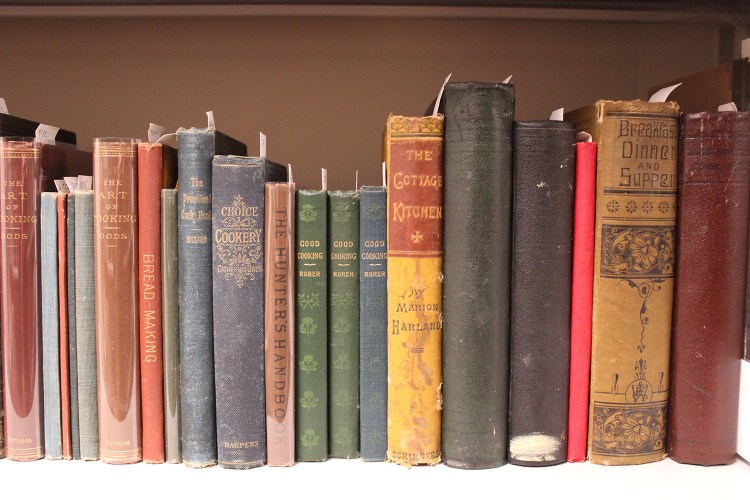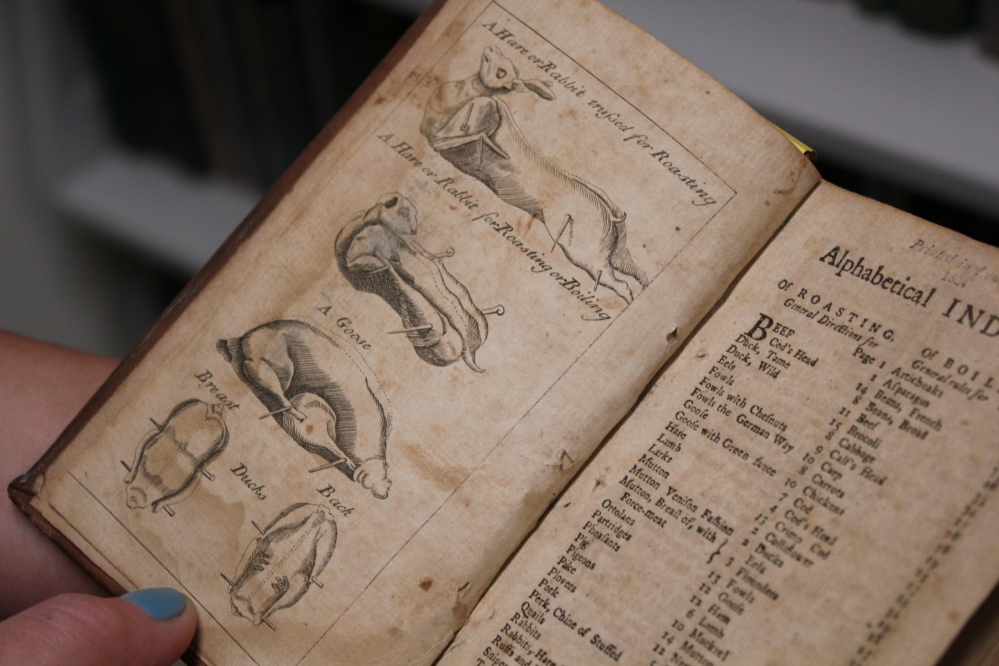If you want to know how to cook calf’s head pie or discourage a loved one from drinking, Bowdoin College now has the answers.
The liberal arts college in Brunswick announced Tuesday that it had acquired a 700-volume collection of American cookbooks, including many from the final days of Colonial life. The books came to the college from a private collector in New York who worked with Biddeford-based bookseller Rabelais Inc. to place the collection.
“The breadth is astonishing,” said Bowdoin Library Director Marjorie Hassen. “It demonstrates the history of the culinary arts in this country, as well as early American life and right up through the 20th century. It’s an extraordinary resource for the study of social and cultural history.”
Just as modern cuisine is trendy, so too is interest in the history of food and its preparation. With this acquisition, Bowdoin joins a growing list of colleges and universities with specialized collections focusing on the culinary arts. The Schlesinger Library at the Radcliffe Institute for Advanced Study at Harvard University houses the best-known collection.
Bowdoin’s collection is unique for Maine, Hassen said.
It was assembled over many years by a now-retired New York banker, Clifford Apgar. He worked with Rabelais to place the collection where it could be used for research. Rabelais specializes in books about food and drink, and has worked with Apgar to help build the collection.
The collection is named in honor of Esta Kramer, who donated money to the college for its purchase. Kramer, a former magazine editor in New York, lives in Damariscotta. She and her late husband, former New York Times culture critic Hilton Kramer, have a long association with the college.
The Esta Kramer Collection of American Cookery offers more than insights about food and its preparation. The collection includes tips for penny-wise and inexperienced housewives. There are how-to books for servants, and cookbooks geared to hunters, professional chefs and kids. The earliest title in the collection dates to 1772. The most recent is from 1960.
Marieke Van Der Steenhoven, outreach fellow for the George J. Mitchell Department of Special Collections & Archives in Hawthorne-Longfellow Library at Bowdoin, said the collection documents social change in America over that time through our shifting tastes in food. Major moments in American history can be told through cookbooks, she said, and this collection offers insight into the women’s suffrage movement, the Civil War, the African-American experience, immigration and the westward expansion.
“When you read these books, you can put yourself in the shoes of someone who would consume this food,” she said.
At least in some instances, the reaction may be one of repulsion.
If calf’s head pie isn’t enough to make you turn away from the table, how about eel pie? Or a cake that requires 15 pounds of sugar and 10 pounds of butter?
That key to discouraging a loved one from drinking? One book suggests placing three live eels in the hooch. On the other hand, another suggests that alcohol is a route to a healthy life. “Lives, without doubt, have been saved by the use of champagne,” writes Fannie Merritt Farmer in “Food and Cookery for the Sick and Convalescent,” published in 1907.
There are church cookbooks, regional cookbooks, celebrity cookbooks and early books about vegetarianism.
Rabelais owner Don Lindgren has been working with Apgar as a client for about a decade. Apgar built much of the collection by going out on weekends with his wife, visiting antique shops, bookshops, yard sales and anywhere else he might find books. He bought any cookbook published before 1900, adding those published afterward on merit.
Three years ago, Apgar invited Lindgren to his home near Albany, New York, to talk about selling the collection. He wanted to place it with an institution that would keep the collection together and make it available for research.
This spring, Kramer came into the shop. “She has been a fan and a friend, and we have occasionally dined together,” Lindgren said. “I started talking about this collection, but never in my wildest imagination did I think she would be the donor.”
Keeping it in Maine is a bonus, Lindgren said. “I think it’s a great thing for Maine, and I think it will provide a resource for people at Bowdoin and some others who are not at Bowdoin to further the understanding of food here in Maine and elsewhere in America.”
Lindgren declined to put a dollar value on the collection. As with any collection that seeks to be a cross-section of an entire field, there are books that are very valuable and books that are readily available and not very expensive, he said.
“There are books you could acquire for $10, books you could not acquire for less than $5,000 and everything in between,” he said.
The value of the collection is its size and breadth, Lindgren said. It is larger than most institutional collections, and includes more than three dozen titles that cannot be found elsewhere, he said.
Send questions/comments to the editors.




